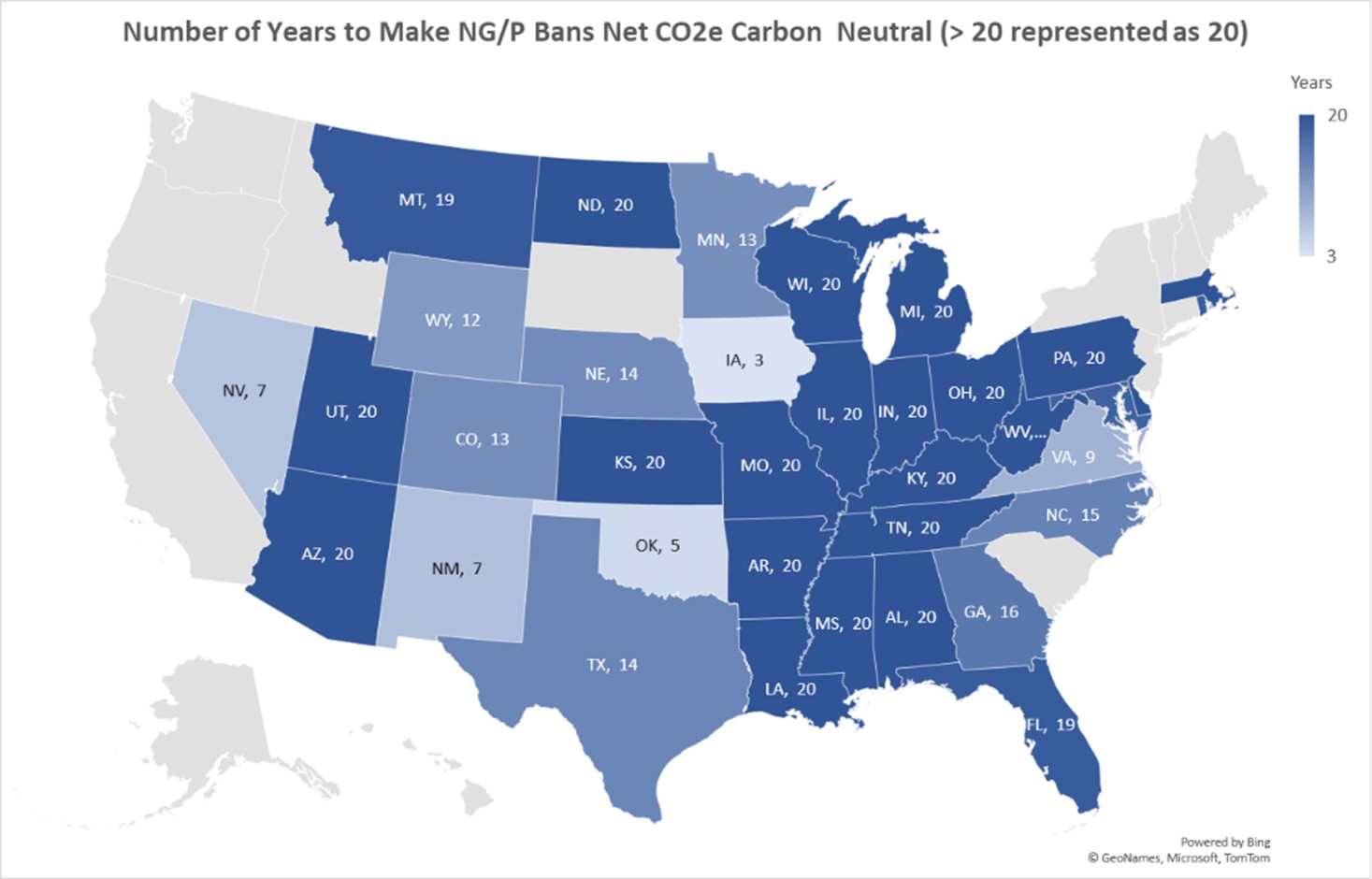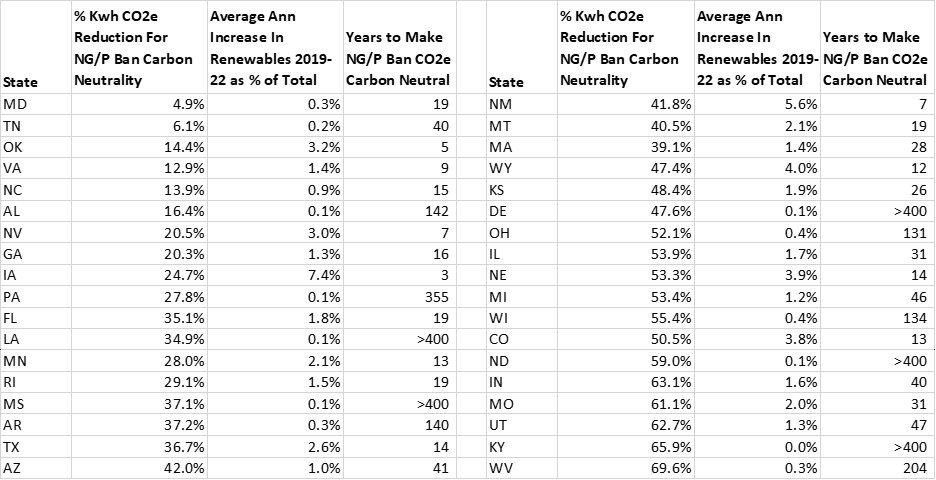| Update: NG Water Heater Ban: CO2 & Cost Impacts |
Will Increasing Utility Generation Renewables Make Natural Gas Bans Attractive in More States in the Future? Ten Year Forecasts Identify 5 States as a Yes and 31 States as a No
Jerry Jackson, Ph.D., March 28, 2023

 Follow @maisyenergydata
Follow @maisyenergydata
 Two weeks ago, we presented results of a study that showed that bans on natural gas/propane (NG/P) water heaters would increase both
CO2e levels and consumer costs in 36 states. The analysis was based on current state-level CO2e emissions factors that reflect the
current mix of electric generation fuels, including renewables. The 12 states where a ban would reduce CO2e emissions included
VT, WA, NH, ID, OR, SD, ME, CA, SC, CT, NJ, NY. For the other 36 continental states, requiring homeowners to switch to electricity
for their water heating would actually increase CO2e emissions because added electric demand would generate more emissions than
emissions saved by the NG/P ban. (The original white paper can be accessed here
Two weeks ago, we presented results of a study that showed that bans on natural gas/propane (NG/P) water heaters would increase both
CO2e levels and consumer costs in 36 states. The analysis was based on current state-level CO2e emissions factors that reflect the
current mix of electric generation fuels, including renewables. The 12 states where a ban would reduce CO2e emissions included
VT, WA, NH, ID, OR, SD, ME, CA, SC, CT, NJ, NY. For the other 36 continental states, requiring homeowners to switch to electricity
for their water heating would actually increase CO2e emissions because added electric demand would generate more emissions than
emissions saved by the NG/P ban. (The original white paper can be accessed here
Several thoughtful comments suggested that this outcome will change soon as renewables become a larger part of the electric generation mix. We decided to extend our analysis to reflect CO2e impacts ten years in the future assuming the percent of solar and wind resources in each state increases at an annual rate observed from 2019-2022 based on EIA-923 Report on Electric Utility Generation data. As shown in the chart below, one state (Iowa) would achieve a net CO2e reduction from a NG/P ban in 3 years. Four other states could achieve net reductions within the next decade including Oklahoma (5 years), Nevada and New Mexico (7 years) and Virginia (9 years) based on recent state increases in electric generation renewables. Some states are so heavily dependent on fossil fuel generation and are increasing their renewable electric generation at such a slow rate that they are unlikely to achieve net CO2e reductions with NG/P water heating bans within 20 years. The chart above shows the number of years required to achieve net CO2e reductions with a NG/P water heating ban for each of the 36 states. The time horizon for 17 states extends beyond 20 years (time horizons longer than 20 years are shown as 20 in the chart). The table below includes the % reduction in state CO2e emissions required to achieve net CO2e reductions with a NG/P water heating ban, the average annual increase in renewables from 2019-2022 and the number of years required to achieve a carbon neutral NG/P ban.  Study Data Sources
Results presented in this analysis are based on MAISY (Market Analysis and Information System) residential utility
customer energy use information for more than 6.5 million individual households across the US and from state-level data
provided in the 2019-2022 EIA-923 Report on Electric Utility Generation Fuels. Click Here
for additional information on
MAISY databases.
Study Data Sources
Results presented in this analysis are based on MAISY (Market Analysis and Information System) residential utility
customer energy use information for more than 6.5 million individual households across the US and from state-level data
provided in the 2019-2022 EIA-923 Report on Electric Utility Generation Fuels. Click Here
for additional information on
MAISY databases.
About the Author Dr. Jerry Jackson is an economist and former Signature Professor at Texas A&M University, Chief of the Applied Research Divisions at Georgia Tech Research Institute and economist at Oak Ridge National Laboratory and the Federal Reserve Bank of Chicago. He counts more than 200 government and private organizations as consulting clients. He is President of Jackson Associates (JA) and the author of MAISY Residential and Commercial Utility Customer Energy Use and Hourly Loads Databases. MAISY data have been used by the US Department of Energy in analysis supporting appliance efficiency standards, by state regulatory agencies from Texas to New York, and by dozens of solar, CHP, battery and other energy equipment manufacturers, utilities, and retail electricity providers. Dr. Jackson has provided testimony in a variety of state and provincial hearings as an expert witness. He holds a Ph.D. in economics from the University of Florida with specialties in econometrics and regional economics. Click Here for a partial list of JA clients. |
Related Topics |